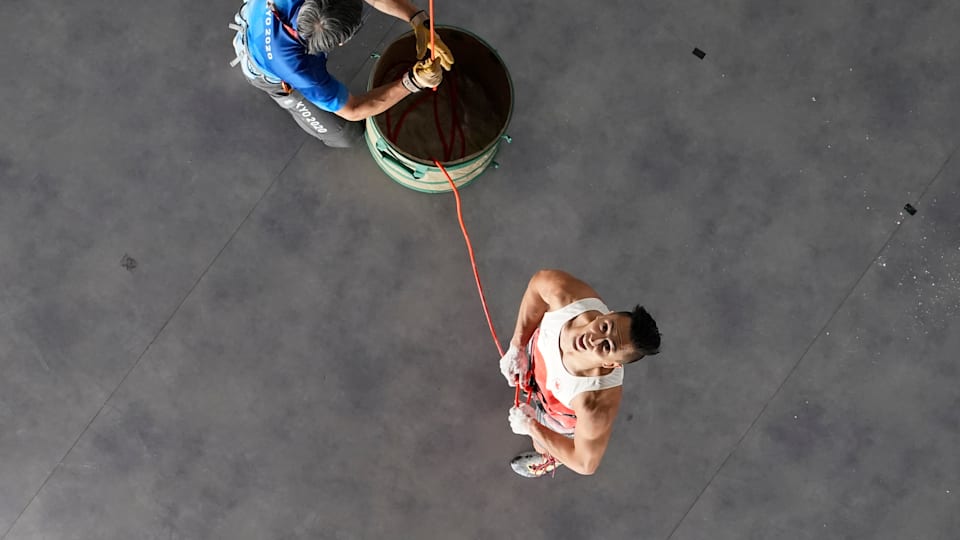From tackling boulders to solving Rubik's Cubes and fighting ninjas: How Sean McColl uses his problem-solving talents outside the gym
Solving puzzles is what Canada's Sean McColl does best, whether it's finding the optimal route on a climbing wall, completing a Rubik's Cube, or swinging through an obstacle course on a metal chain. Tap into the world champion's mind with Olympics.com.

Thirty-two seconds is a competition time that Olympic speed climbers, who typically take less than five seconds to scale a wall, would be horrified with.
Four-time world champion in sport climbing Sean McColl could not be more proud of it.
“My personal best was 32 seconds,” the Canadian athlete told Olympics.com about his record for solving the Rubik’s Cube. "For me, it's pretty good. I'm very happy."
A perfectionist through and through, the Olympian from Tokyo 2020 in 2021 devoted a year of his free time from training to studying the algorithms of the 3-D puzzle until it took him consistently under a minute to get all the colours matched up.
This prowess in problem-solving is what initially attracted McColl to sport climbing and kept him in the sport for 26 years. It is also the secret behind his other hidden talents, be that playing lightning-fast piano scales or getting through an extreme obstacle course on a reality show.
And the next puzzle McColl needs to solve is the biggest one yet - qualifying for his second Olympic Games, Paris 2024.
Olympics.com spoke to the veteran sport climber ahead of his appearance at the 2023 Pan American Games in Santiago, to find out his approach to problems, and how solving the Rubik's Cube makes him a better athlete.
Sean McColl: A panache for problem solving
What do a Rubik’s Cube and a sport climber have in common?
A lot, according to boulder and lead specialist McColl whose innate urge to solve problems - and keep doing it faster and faster - ignited the moment he first held the cube.
"For me, part of the Rubik's Cube and the problem solving was to study something for a little bit and see how good I can get in a certain amount of time," he explained. "So with the Rubik's Cubes, I picked one up one day and I was like, 'OK let's see if I can solve it with no help, nothing on the internet, no algorithms'. And I couldn't. I got the first two layers, and the third layer is actually the hardest. And then I had to look it up to know how to solve it.
"And then I was just like, 'How fast can I do it?' You know, three minutes, two minutes, eventually one minute. And then to get it consistently under one minute actually took a lot more time because I ended up having to learn more algorithms."
All in all the process took about a year. Now McColl can solve the Rubic's Cube standing up, sitting down, or even while doing a plank.
His best time is just over 30 seconds. McColl, who describes himself as "extremely competitive" admitted there is still room for progress.
"There is kind of different tiers, and the next tier is when you can do it consistently under 20 seconds, and then 10 seconds is the tier after that," McColl said. "(Mine) wasn't really good. Just good. Not going to the world championships in Rubik's Cube solving, but I was on my way."
In addition to being a four-time world champion in sport climbing, Sean McColl can solve the Rubik's Cube in 32 seconds.
Sean McColl: Solving the climbing wall
McColl played football since he was four years old, but when he picked up sport climbing six years later, the problem solving allure of his second sport proved impossible to resist.
At age 21, he switched his focus from plotting team strategies on grassy pitches to solving individual puzzles on plywood walls.
"In climbing, it's a little bit unique in our sport and there are few comparisons," McColl said. "It's because we've never seen the course or the route that we're going to be doing both in boulder and lead climbing before we go out to try it.
"Before the competition, we're in an isolation zone," he continued. "When you come out to the competition venue, you get to see a boulder problem or a lead that you've never climbed before. Maybe you know some of the holds, you can figure out in your head what type of moves you're going to be doing, and then you have five minutes or sometimes less or a little bit more.
"It would be as if there was a hidden golf course...You have to hit your shot in 40 seconds. You don't get to walk it. You just look at it and then you hit your shot."
Ninja obstacle courses: Taking problem solving to the extreme
McColl's passion for problem solving also exhibits itself in his proficient piano playing and smooth golf swing. But not all of his hidden talents are so tame.
The Canadian Olympian competed in four editions of the American Ninja Warrior reality show from 2014 to 2018. On the show, contestants work in teams to complete a variety of extreme obstacle courses, which saw McColl swing on ropes and chains, and jump onto moving platforms.
"What was really cool for me was that I was one of the first professional climbers to go on the show. So for me, it wasn't just about being a ninja warrior, it was that I was representing all of the climbers because everyone always said, 'Oh, you're climbing. You'd be really good at that show. You should go and try it'," McColl said. "And I was nervous, mainly because I was representing all the climbers doing it.
"It's kind of like parkour, climbing, an adult playground, because you're doing moves that you want to try, but I can't just jump to some part of a house and jump off that because it'll probably break. So in Ninja Warrior, you get to do all these really fun things, like an adult in the kids store and then it's a competition so I kind of excel at that."
As with all his problem-solving ventures, be that a Rubik's Cube or a "Double Salmon Ladder" obstacle set-up, McColl finds a way to bring the benefits back to his sport climbing.
"It probably expanded my mind to the type of climbing movements they do in the parkour world," McColl said about how competing in American Ninja Warrior helped his climbing career. "So you're on a rail or something and you basically do a really big swing, and then as you do the big swing forward, you let go, you travel a few metres and then hit onto your next hold or rail or something like that.
"In sport climbing, or climbing in general, there's almost no moves like that. So when we started seeing a little bit more and more, people were like, 'Oh, no, no, no, no, we don't want that. That's too parkour'. But then slowly it developed and it meshed with climbing where now on our bouldering circuit and sometimes even on lead climbs with the ropes, we see moves that are very much like jumping or swinging and using that lache style from parkour and stuff like that in our competitions."
Next puzzle: Paris 2024
The next challenge McColl needs to solve is qualification to his second Olympic Games.
And this is the equation in front of him: a three rather than four-year Games cycle, barely one off-season in between, one serious injury in 2022, followed by a jump straight into the qualification year including the Pan American Games Santiago 2023, which serves as a direct qualifier for Paris 2024. All at 36 years old.
"Being a veteran in climbing, I've known that now for a number of years of being one of the oldest for a while. I've seen multiple generations of climbers start and end their careers," McColl said.
"I would love to be a two-time Olympian just because, hey, I'm 36 now. I qualified for my first Games at 32. I can hopefully qualify to my next at 36. But if I don't, I've done so much for the sport. I'll continue to be invested in the sport, regardless of what happens. I'll get over it and I'll be happy. And obviously just icing on the cake if I can do it a second time."

